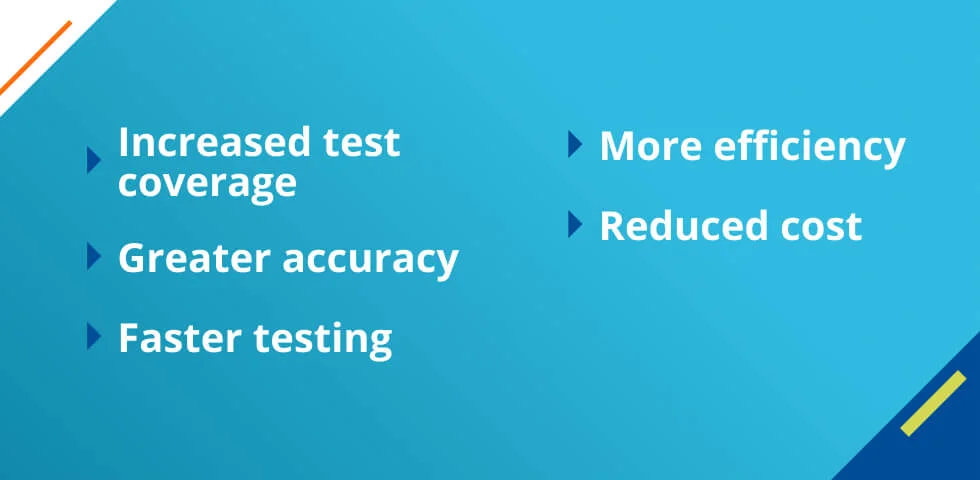
What is automated software testing?
In software development, automated software testing uses technology to validate that an application or its components are free of defects and functioning as intended. Testing happens throughout the development process, from unit tests that validate bits of code or individual functions to end-to-end testing that evaluates the specifications, performance, and user experience of an application.
Automated software testing can be performed both by developers as the write code and by quality assurance (QA) teams. By making testing easier, faster, and more accurate, automated solutions help accelerate the development process, reduce the effort required for testing, allow more aspects of an application to be tested, and improve the quality of the final release.
The benefits of automated software testing
Automated testing offers organizations and their development teams several critical advantages.
- Increased test coverage. Automated testing enables teams to test a much higher percentage of code and functionality in an allotted testing timeframe, enhancing the quality of the application without slowing development timelines.
- Greater accuracy. Automated software testing solutions are far more accurate than error-prone manual methods. Manual testing is especially difficult with complex and highly interconnected applications. In contrast, automated tests can find bugs and issues in complex software with far greater accuracy.
- Faster testing. Tests like regression testing – when software is tested after changes are made to ensure that no functionality has been lost – are incredibly time-consuming. They’re also quite tedious, causing human testers to frequently make mistakes and overlook bugs. By automating these critical but routine tests, development teams can dramatically increase the speed of development.
- More efficiency. Automated testing allows test scripts to be used multiple times with minor changes.
- Reduced cost. By testing with greater accuracy and speed, automated solutions allow development teams to find bugs earlier in the process, at a time when fixing them is much easier and far less expensive.

Types of automated software testing
With the right testing solution, many common types of software tests can be automated to accelerate timelines and improve accuracy.
- Unit tests evaluate a single function or unit of code in isolation from other parts of the software. These are usually the earliest tests performed on code.
- Functional tests are a type of black box testing that validate whether an application is capable of performing specific functions as intended.
- Smoke tests are designed to quickly verify whether a build is stable enough to continue testing.
- Integration tests validate whether various components of an application are working together as intended.
- Regression tests are performed to make sure that an application hasn’t lost any functionality after changes have been made or new code is added.
- API tests ensure that an application can easily integrate and communicate with other applications and systems.
- Load testing examines how software behaves under difficult conditions like a spike in transactions or an inflow of user logins.
- Security tests identify any vulnerabilities or weaknesses in a system that could be exploited by cybercriminals.
- Performance tests determine how quickly and successfully an application processes transactions or performs the tasks for which it was designed.
- Acceptance tests validate whether an application delivers the features and requirements specified by the client.
- UI tests, or user interface tests, examine an application from the user’s perspective to evaluate the quality of user experience.
Automated testing vs. test automation
While the terms “automated testing” and “test automation” are often used interchangeably, these technologies are not identical. Automated software testing uses technology to test software in a variety of ways – it’s the opposite of manual testing. Test automation uses technology to manage, track, and organize tests more efficiently – it may manage both automated and manual testing tasks.
Both automated software testing and test automation software are critical to continuous testing, which integrates testing throughout the software development lifecycle (SDLC) to accelerate timelines while ensuring high-quality releases.
Automated software testing increases the speed, quality, coverage, and accuracy of testing while minimizing costs, allowing DevOps and QA teams to test code during every phase of the development process. Test automation simplifies the task of scheduling, tracking, and communicating about a myriad of tests on a variety of applications. It allows teams to stay focused on actually testing and improving the software without getting bogged down in the minutia of testing details.
The Tricentis automated software testing platform
Tricentis is a testing platform that delivers tools for automated software testing. With an approach to testing that is totally automated, fully codeless, and driven by AI, Tricentis helps dramatically accelerate digital transformation, application delivery, and cloud migration.

With Tricentis, testing takes minutes or hours rather than days or weeks, while increasing the accuracy, efficiency, and cost-effectiveness of testing processes. Tricentis’ end-to-end automation platform is built from the ground up to serve the needs of the enterprise. An AI-driven and model-based approach allows everyone from developers to business experts to participate in automated testing. Tricentis delivers complete visibility across all the tools in the software delivery lifecycle while providing centralized reporting that speeds remediation and enhances collaboration.
The Tricentis platform includes a comprehensive suite of testing solutions.
- Tricentis qTest delivers centralized test management with tools for unifying, managing, and rapidly scaling testing across the enterprise. With Tricentis qTest, teams can manage everything from unit and functional testing to exploratory and white box testing.
- Tricentis Tosca provides intelligent test automation driven by Vision AI to optimize and accelerate testing of enterprise, mobile, and cloud-native applications. Tricentis Tosca Orchestrated Service Virtualization (OSV) makes testing easier by simulating the behavior of dependent components through service virtualization.
- Tricentis NeoLoad delivers simple and scalable performance testing for everything from APIs and microservices to end-to-end testing of applications.
- Tricentis Data Integrity offers automated end-to-end data integrity testing that works across the entire data landscape to prevent migration, integration, and reporting issues.
- Tricentis LiveCompare features smart impact analysis powered by Risk AI to help de-risk SAP changes.
- Test Automation for ServiceNow offers automated testing for ServiceNow applications and workflows built on the NOW platform.
